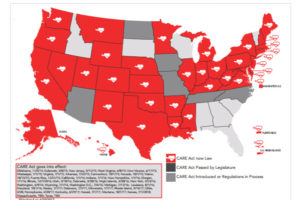5 Ways Seniors Can Avoid the Summer Heat in Phoenix

The human body is a magnificent mechanism! Not only does it have an innate ability to fight off disease and dangerous bacteria, but also has the capacity to trigger physical symptoms in situations that could cause potential harm before they occur. One such indicator transpires when we are overheated, such as dizziness, sweating, and swelling. Unbeknown to most is that as we age into our 80’s and 90’s, some of our physical indicators because inept, such as inefficiencies in our sweat glands, which could be potentially fatal for an elderly individual in situations of extreme heat.
For seniors residing in one of Phoenix’s many senior living communities, such as an assisted living facility or specialized Alzheimer’s Care Unit, there are staff members constantly watching and monitoring their actions and whereabouts. In these situations, there is little risk of overheating during the boiling summer months. On the contract, for seniors who still live independently at home, and without supervision, suffering a heatstroke is not only dangerous but can be potentially fatal. Below are 5 ways seniors can avoid the summer heat.
- Avoid Alcohol and Know Your Prescriptions: Sitting poolside in Phoenix is always fun with a cocktail in hand, but remember that when alcohol enters the blood stream it causes dehydration. Also, it’s important to remember that dehydration is a side effect of many common prescription drugs for seniors such as blood thinners, diuretics, and antihistamines.
- Don’t use the Stove or Oven: Most homes in Phoenix have an excellent air conditioning system. During the summer months your air conditioner probably runs all day long. However, when we cook in the stove or oven it heats the surrounding environment, regardless if the air condition is on. Try to eat more salads, raw foods, or even microwaved foods, in order to avoid overheating your home.
- Wear Sunscreen SPF-30 or Higher: This seems obvious but you would be surprised how many people have SPF-15 in their drawer at home. Sunburns last longer than heat exhaustion because they physically alter your body for an extended period of time and can easily result in a heat stroke, especially when located in areas around the head and neck. Be sure to wear higher SPF sunscreen and reapply often.
- Park Your Car Inside: Whether you live a condo or house, during the summer months in Phoenix you should avoid parking your car outside. Try and park in a garage, or at the very least, under a shaded area. Heat strokes can occur among the elderly in a matter of minutes. We also recommend running the air conditioning for at least 5 minutes while the car is in park, and before you steer out on the hot black asphalt.
- Watch Your Diet: Food with heavy salt levels such as nuts, processed foods, pretzels, and tortilla chips, can increase the chance of dehydration. Stay away from salty foods during the hot summer months. Also, try and eat lighter and healthier, in general. Being overfull and exhausted from food is a bad combination with 110 degree heat.
Article written by Alex Milzer with Senior Directory, LLC











